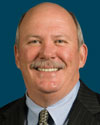...and construction firm’s management consulting division. But he concedes technical professionals must better understand clients’ business needs and be “more proactive in interacting directly.” Parsons Brinckerhoff CEO George Pierson notes that his firm’s “people are open to change the way they work, and we are going to great pains to involve our folks in the process.”
While there have been “unpleasant staffing adjustments,” as one firm euphemistically termed layoffs, more firms have turned to work-sharing arrangements and staff retraining to avoid them.
Iver Skavdal, CEO of Eureka, Calif.-based engineer Winzler & Kelly, says the firm averted the fate of some of its peers—“laying off staff in droves”—with a pre-recession strategic plan that includes a customized training program “for our seller-doers.” But he notes challenges in “migrating” staff from down markets to rising ones and finding experienced managers to take high-level marketing roles.
Jim O’Neill III, president of Quanta Services Inc., Houston, says the energy infrastructure specialist made it through a challenging 2009 by creating new markets for itself. A strong balance sheet allowed it to acquire Price Gregory Services Inc., a leading gas transmission pipeline firm. Quanta also rolled out a patented “microtrench” technology that will allow it to install fiber-optic cables in dense urban markets. The process was taken from concept to reality in less than a year, O’Neill says. “We actually believe we will be able to capture market in areas that we weren’t in previously,” he adds.

CEO, JACOBS ENG.
WD Partners, a Dublin, Ohio, architect-engineer, sees specialization as its recession antidote, with a focus on providing branding and design services to retail and restaurant customers. “This is the equivalent of R&D in manufacturing. It gives us a glimpse of our clients’ future strategies, which in turn allows us to plan to be ready to execute when they’re ready,” says Sam Khalilieh, senior vice president of engineering services. But, he says, changing client needs will require the firm to grow new specialties among its professional staff.
Some firms see promise in positioning themselves to help their clients meet new business priorities, such as supporting the green movement. “In the new normal, we think sustainability will emerge as the driving issue as the world struggles with economic growth while constrained by natural resources,” says Patrick McCann, CEO of Weston Solutions Inc., West Chester, Pa.
Topeka, Kan.-based Bartlett & West Inc., points to some growth benefit last year from its Midwest market base, “which was somewhat insulated from the deep recessionary effects seen nationally,” says Joseph M. Bichler, executive vice president. He sees a “slight improvement” in the firm’s infrastructure work related to housing and commercial development markets this year, as projects emerge from deferred status. Says Bichler, “needs in our communities are still there.”

PRINCIPAL, PAGE SOUTHERLAND PAGE
Omaha-based engineer Leo A Daly is one of many firms that are expanding an international presence, with some signs that overseas markets will recover faster. Daly is eyeing emerging markets—such as senior living, science and technology, and water reuse—to help compensate for its shrunken commercial sector and only a small stimulus benefit. “We are looking at 2011 before we see normalization and a return to double-digit growth,” says Charles D. Dalluge, executive vice president.
Stimulus-boosted public markets may be some firms’ only alternative, despite different procurement approaches and more competition. “One of the dangers for building contractors is to assume that because they can pour concrete, a bridge or water treatment plant can’t be that hard,” says FMI’s Rice.
Debra Lupton, CEO of TLC Engineering for Architecture, Orlando, ramped up company attendance at key federal sector conferences, such as FEDCON and the Society of Military Engineers, to gain insight into the marketplace...





Post a comment to this article
Report Abusive Comment